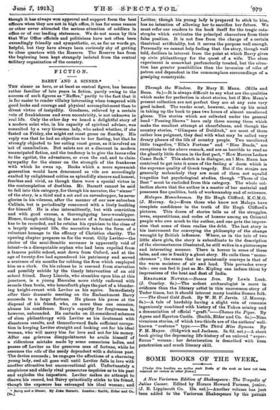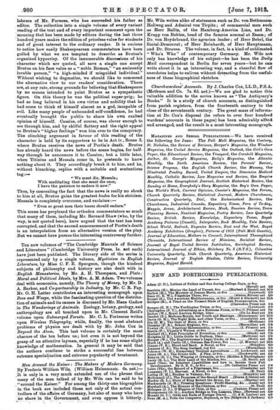SOME BOOKS OF THE WEEK.
[rTacTer tide heading ire vette* such Boas of the Irak as hays not Wen resorted for review in other Anna] A New Variorum Edition of Shakespeare : The Tragedie of Julius Caesar. Edited by Horace Howard Purness, junior. (J. B. Lippincott Co. 15s. net.)—Another volume has just been added to -the Variorani Shakespeixa by the patient
labours of Mr. Furness, who has succeeded his father as editor. The collection into a single volume of every variant reading of the text and of every important comment upon the meaning that has been made by editors during the last three hundred years makes the edition of priceless value for students and of great interest to the ordinary reader. It is curious to notice how easily Shakespearean commentators have been gulled by what we are tempted to describe as Brutus's organized hypocrisy. Of the innumerable discussions of his character which are quoted, all save a single one accept Brutus on his face value as a " noble Roman," " an eminently lovable person," "a high-minded if misguided individual." Without wishing to dogmatize, we should like to commend the alternative view to our readers' consideration. There are, at any rate, strong grounds for believing that Shakespeare by no means intended to paint Brutus as a sympathetic figure. On this theory be was the political super-prig ; he had so long believed in his own virtue and nobility that he had come to think of himself almost as a god, incapable of evil. Like many people of unbounded self-confidence, he had eventually brought the public to share his own exalted opinion of himself. Cassius, of course, was clever enough to see through him, and by skilful flattery and the right appeal to Brutus's "higher feelings" won him over to the conspiracy. The clinching argument in favour of this reading of the character is held by its supporters to be in Act iv., Scene 3, where Brutus receives the news of Portia's death. Brutus has already heard the news before the scene begins, for half- way through he announces it to Cassius; but a little later, when Titinius and Messala come in, be pretends to know nothing about it. They accordingly break it to him, and he, without blenching, replies with a suitable and sententious tag
" We must die, Messala;
With meditating that she must die once, I have the patience to endure it now."
Thus, by concealing the fact that the news is really no shock to him at all, Brutus gains the greatest kudos for his stoicism. Messala is completely overcome, and exclaims :—
"Even so great men their losses should endure."
This scene has perplexed the orthodox commentators so much that many of them, including Mr. Bernard Shaw (who, by the way, is not quoted here), have argued that the text has been corrupted, and that the second announcement of Portia's death is an interpolation from an alternative version of the play. But we cannot here pursue the interesting controversy further.















































 Previous page
Previous page